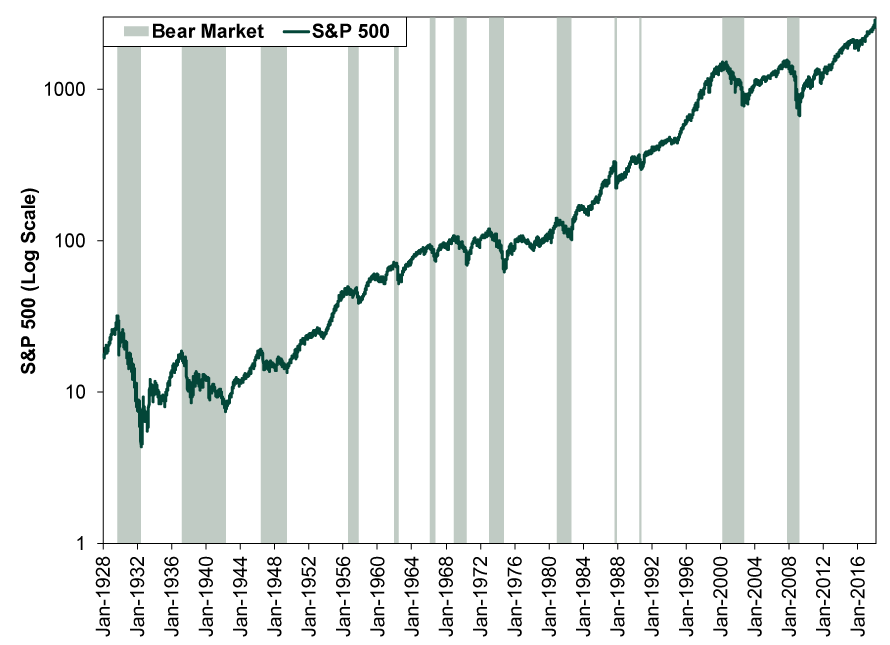Personal Wealth Management / Market Analysis
Nine Years Ago, a Bull Was Born
In which we toast the bull market without tempting fate (not that we are superstitious).
Nine years ago today, a bull market was born. Perhaps history will show it turned nine years old today. Or perhaps we are already one and a half months into a bear market that began on January 26. We don’t think so, but given US and world stocks are about 5% below record highs, there is no way to know without the benefit of hindsight.[i] So while we aren’t going to jinx things by declaring this article a bull market birthday card, it isn’t an epitaph, either. We simply think this is a good time to reflect on a basic market principle: Bull markets have always followed bear markets—and shouldn’t stop doing so.
The reverse is also true, of course: Bear markets—long, fundamentally driven declines exceeding -20%—have always followed bull markets. That probably won’t stop, either. This is why, any time markets take a quick tumble, investors can feel a powerful urge to run for the hills. But since 1926, the S&P 500 has endured only 13 bear markets. Most tumbles weren’t bears, but corrections—short, sharp, sentiment driven declines of roughly -10% to -20%—or just normal, fleeting, short-term negativity. That is why we aren’t lamenting this bull market’s failure to turn nine years old. The pullback that began in late January has all the hallmarks of a short-term thing—a sentiment-driven correction. It was super-fast, with the (as of this writing) peak-to-trough move spanning just nine trading days. Bear markets usually begin gradually, with gentle rolling tops that lull investors into complacency. Those don’t usually become apparent for at least three months or so, which means investors might be in a state of “is it or isn’t it” for several weeks more. While we realize this is probably an unsatisfying statement, sometimes markets just like teaching the “have patience” lesson.
Again, we think this is a correction. Short-term volatility is impossible to predict, so there is no way to know whether new highs are close or another downdraft lurks. Investors have seemingly forgotten about one big fear, inflation, but now tariffs are rattling sentiment. The near-term evolution is unknowable.
But set that all aside. Whenever this bull market’s peak may be, it has already demonstrated some critical points. Not only do bull markets follow bear markets, but overall and on average, they are much bigger and longer than the bears. Exhibit 1 shows the S&P 500 since 1928, plotted on a logarithmic scale so that the long-term effects of compounding don’t hide the first several bears. Most bull markets notched new highs before rolling over—often dozens of them, sometimes hundreds. Hence, despite some very painful bear markets, stocks’ longer-term trajectory is up and to the right.
Exhibit 1: Bulls and Bears
Source: FactSet, as of 3/8/2018. S&P 500 Price Index, 1/1/1928 – 3/8/2018.
Nothing is certain in life, but as long as capitalism exists, we doubt this will stop. Yes, boom and bust will never leave us, but neither will the long-term power of human ingenuity to create and harness the inventions that drive societal progress. Some fret secular stagnation and the lack of a visible tech revolution on par with the personal computer and Internet, but we think this is a myopic, narrow view. This week’s Geneva Motor Show featured multiple flying car concepts (not to mention “living” tires that suck CO2 out of the air—yet another example of the market tackling environmental issues on its own). Robotics and artificial intelligence are progressing by the minute. Advances in virtual reality are making the super-cool parts of Ready Player One look less and less fantastical (alas, the book still whiffed on peak oil). If you have an Instant Pot, congratulations: Your slow cooker, rice cooker and pressure cooker are now redundant. WiFi-enabled sous vide sticks enable folks to unleash their inner gourmet cook for about $100—way cheaper and more practical than a $2,000 sous vide bath that takes up an entire counter. Connected thermostats and security systems improve home heating and security. With all of this genius comes new sources of corporate earnings, and new opportunities to create businesses. And countless reasons for stocks to rise (albeit irregularly) in the long run.
To see this another way, look at the latest Forbes 400, out earlier this week. Of its 22 newcomers, 14 were “self-made entrepreneurs.” Some created radical new things. Others—like Netflix founder Reed Hastings—used technology to revolutionize the delivery of products and services. The aptly named Tito Beveridge just took an old product—vodka—made it really good (and Texan), and developed a cult following. (Though researchers exploring synthetic, hangover-free booze may one-up him someday.) As long as capitalism enables these makers and dreamers to take risks in hope of big profits down the line, there is no reason growth can’t stop. People think of capitalism as big, greedy corporations, but it is really just about using creativity and commerce to solve problems and battle scarcity. There is a galaxy’s worth of room for improvement on both fronts, presenting huge opportunities for long-term growth and stocks.
[i] Source: FactSet, as of 3/8/2018. S&P 500 total return and MSCI World return with net dividends, 1/26/2018 – 3/8/2018. The S&P 500 and MSCI World Index are down 4.4% and 5.2%, respectively, over that timeframe.
If you would like to contact the editors responsible for this article, please message MarketMinder directly.
*The content contained in this article represents only the opinions and viewpoints of the Fisher Investments editorial staff.
Get a weekly roundup of our market insights
Sign up for our weekly e-mail newsletter.

You Imagine Your Future. We Help You Get There.
Are you ready to start your journey to a better financial future?

Where Might the Market Go Next?
Confidently tackle the market’s ups and downs with independent research and analysis that tells you where we think stocks are headed—and why.






